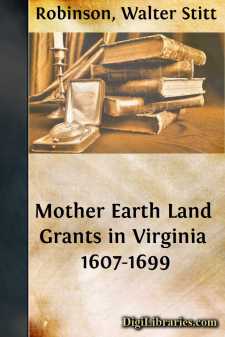Categories
- Antiques & Collectibles 13
- Architecture 36
- Art 48
- Bibles 22
- Biography & Autobiography 813
- Body, Mind & Spirit 142
- Business & Economics 28
- Children's Books 17
- Children's Fiction 14
- Computers 4
- Cooking 94
- Crafts & Hobbies 4
- Drama 346
- Education 46
- Family & Relationships 57
- Fiction 11829
- Games 19
- Gardening 17
- Health & Fitness 34
- History 1377
- House & Home 1
- Humor 147
- Juvenile Fiction 1873
- Juvenile Nonfiction 202
- Language Arts & Disciplines 88
- Law 16
- Literary Collections 686
- Literary Criticism 179
- Mathematics 13
- Medical 41
- Music 40
- Nature 179
- Non-Classifiable 1768
- Performing Arts 7
- Periodicals 1453
- Philosophy 64
- Photography 2
- Poetry 896
- Political Science 203
- Psychology 42
- Reference 154
- Religion 513
- Science 126
- Self-Help 84
- Social Science 81
- Sports & Recreation 34
- Study Aids 3
- Technology & Engineering 59
- Transportation 23
- Travel 463
- True Crime 29
Mother Earth Land Grants in Virginia 1607-1699
Categories:
Description:
Excerpt
CHAPTER ONE
The Land and the Indian
Among the motives for English colonization of America in the seventeenth century, the desire for free land occupied a prominent place. The availability of land in the New World appealed to all classes and ranks in Europe, particularly to the small landholder who sought to increase his landed estate and to the artisans and tenants who longed to enter the ranks of the freeholder.
The desire for land and the opportunity to provide a home for one's family, according to Professor C. M. Andrews, "probably influenced the largest number of those who settled in North America." Land also had its appeal as the gateway to freedom, contributing substantially to the shaping of the American character. When analyzing the factors that helped make this "new man, who acts upon new principles," De Crèvecoeur in 1782 emphasized the opportunity to "become a free man, invested with lands, to which every municipal blessing is annexed!"
Formulation of a land policy confronted the officials of all the colonies in early America. Its importance is reflected in the statement by C. L. Raper in his study of English colonial government that the "System and policy concerning land determine to a very considerable extent the economic, social, and political life of the colonists." The existence of the American frontier with unoccupied land was a potent force in America, and Frederick Jackson Turner stated in his famous essay in 1893 that the "Most significant thing about the American frontier is, that it lies at the hither edge of free land."
Before analyzing the nature of landholding and the land policy that was adopted in early Virginia, let us examine first the problem that arose by virtue of the presence of the Indians in North America.
At the time of the settlement of Jamestown in 1607 the area of present-day Virginia was occupied by Indians of three linguistic stocks: Algonquin, Siouan, and Iroquoian. Generally speaking, the Algonquins which included the Powhatan Confederacy inhabited the Tidewater, reaching from the Potomac to the James River and extending to the Eastern Shore. The Siouan tribes, including the Monacans and the Manahoacs, occupied the Piedmont; while the Iroquoian group, containing the independent Nottoways and Meherrins, partially surrounded the others in a rough semicircle reaching from the headwaters of the Chesapeake through the western mountains and back to the coast in the region south of the James River.
The presence of these tribes in the areas of proposed colonization confronted the colonizers of the sixteenth and seventeenth centuries with the same problem that has faced imperialists of a later date, the question of "right and title" to land. The British, like other European nations, did not recognize the sovereign right of the heathen natives but claimed a general title to the area by the prevailing doctrine of right by discovery and later by the generally accepted doctrine of effective occupation. As stated in the charter to Sir Walter Raleigh in 1584 with essentially the same provision included in the first charter of Virginia in 1606, the colonizers were authorized to occupy land "not actually possessed of any Christian Prince, nor inhabited by Christian People." Over the Indians the British maintained a "limited sovereignty"; and when acknowledging any claim, they recognized only the Indian's right of occupation and asserted the "exclusive right" to extinguish this title which occupancy gave them....


